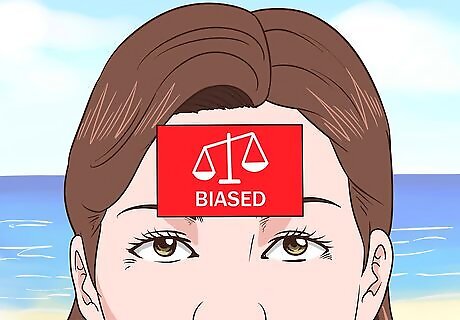
views
Altering Your Worldview

Admit you have issues with control. If you're controlling, you may have a tendency to assume you're right. Recognize when you feel your way is the only way to complete a task. Acknowledge that the problem is your need for control and not someone else's shortcomings. It's easy to simply say to yourself, "I have control issues." You need to carry that mentality into day to day interactions. For example, if you find yourself trying to micromanage how your spouse does the dishes, remind yourself, "This is me being controlling. It's not my spouse's fault."

Focus on recognizing your own emotions. People who feel the need to control their surroundings often struggle to contain their own emotions. They may also struggle to recognize or express their emotions, and the controlling behaviors help keep their emotions in check. Acknowledge what you're feeling when you feel the need to control. Ask yourself why you're feeling this way and how you can manage your feelings. Label your emotions as they occur. For example, think, "I'm frustrated" if you feel the need to control a situation. There are other ways to deal with frustration other than control. Try going for a long walk to wind down, for example, instead of micromanaging the situation.
Examine any issues you have with trusting others. People who are controlling often struggle to trust others. Ask yourself what trust issues you have, and what caused them. Then take steps to learn to trust. When you feel the need to control something, ask yourself if you're struggling to trust. Think about things that happened in your past that made you lose trust. Did someone close to you let you down? Did you feel betrayed by someone important to you? Did someone break your heart? Choose someone important to you and start practicing trust with them. Notice when this person fulfills on a promise and is there for you. Try confiding in them and allowing them to handle some of the things you feel the need to control. Consider seeing a counselor to work on your trust issues.
Focus on what you can control. It's important to learn the difference between what you can and cannot control. You can only control your own thoughts and reactions. You have no control over what others say, think, or do. You can change yourself, but not others. Remember that your reaction to things can only harm you. Having a negative reaction to things will not hurt the other person as much as it hurts you. Take care of yourself by changing how you react to issues. When something goes wrong, take a deep breath, give yourself a moment to clear your thoughts, remind yourself that it isn't the end of the world, and mentally list the positives that could come from the setback. You could say, "Although I'm worried this traffic will make me late, I can use this time to listen to the latest episode of my podcast. I'll let people know I'm running late, and they'll understand that this happens sometimes."

Question your own beliefs. When you feel the need to control, ask yourself why you feel that way and question that feeling. Control is often rooted in a rigid worldview. Challenging that worldview can help you learn to let things go. When you start feeling controlling, pause and state why you're feeling that way. Ask yourself what underlying assumption is driving your need for control. For example, a co-worker wants to take a more lighthearted approach to a presentation. You don't want to listen to their perspective. Stop and think to yourself, "I'm assuming my approach is correct, but I actually don't know the audience as well as my co-worker. I'm being controlling because public speaking makes me nervous and I need to back down."

Accept some chaos. Controlling people often have trouble accepting that life is unpredictable. If you have a heightened need for control, work on accepting life is sometimes chaotic. You can't always predict how a situation will unfold and none of your actions will change the outcome. Remind yourself in moments of chaos that there's nothing you can do. Think to yourself, "I can't fix this problem. I just have to live with the chaos for now." You can also actively try to embrace spontaneity. Take a day off on a whim, spend money on a treat for yourself, or have a last minute date night with your partner.

See a therapist. Not everyone can overcome controlling tendencies on their own. If you're struggling from control issues that stem from feelings like stress and anxiety, a therapist can help you sort out your issues. You can ask your regular doctor for a referral, search online, or get a list of therapists from your insurance provider to help you find someone to sort out your control issues.
Changing Your Behavior

Put someone else in charge of a situation. Letting other people take charge can gradually teach you to relinquish control over time. Start small. Let a co-worker pick a restaurant you're ordering lunch from. Gradually build up to bigger tasks. For example, let a co-worker decide the agenda for a meeting at work. Play to people's strengths. If you feel the people you're putting in charge are skilled, you'll feel more comfortable letting go of control. For example, put a co-worker who's great a math in charge of budgeting for a project.

Recognize and avoid your triggers. Controlling people are often set off by certain situations. A great way to curb your controlling tendencies is to recognize your trigger. Figure out when you're likely to feel the need for control and avoid those situations. For example, maybe you don't do well in big group settings. You get nervous and try to micromanage what you do and where you go. Try to hang out with friends in small groups of one or two people to reduce your controlling tendencies.

Change how you communicate. If you're not getting through to people, you may feel an extra urge to control. Learn to adjust your communication style between individual people. If you're able to express yourself more easily, anxiety won't bring out control freak tendencies. Pay attention to how people respond to different types of communication. If a co-worker seems upset after you give them blunt feedback, maybe they don't respond to a "tough love" approach. Adjust your communication style next time to see if you can get through to them better. Add compliments between the criticisms and encourage your co-worker to come to you and ask for help if they're ever confused.

Ask people you trust for help. If you're reaching out to people you trust, you'll be less likely to micromanage. If an overwhelming situation is bringing out your control freak tendencies, ask your most trusted co-workers, friends, and family members for help. This way, you'll be able to step back and relinquish control more easily.

Have people keep you in check. Let a few trusted friends and co-workers know you're actively trying to be less controlling. Tell them you would appreciate it if they would tell you up front if you're micromanaging a situation. This way, you can learn to recognize and then adjust your behavior as needed. It's a good idea to suggest a humorous code word to use when you're being controlling. For example, they could say "bugaboo" when they feel you're behavior is too controlling. This will help you all keep the situation light.
Acknowledging Other People's Perspectives

Have compassion for other people's mistakes. Everyone makes mistakes. If you're able to accept this rather than getting angry or frustrated, you'll become less controlling. Being concerned about other people screwing up can increase your need to micromanage a situation. If you see someone make a mistake, put yourself in their shoes. Remember a situation where you screwed up in a similar fashion. It probably wasn't the end of the world, and sometimes you need to let people make their own mistakes. For example, your spouse forgot to pick up a prescription from the pharmacy. You've probably made similar mistakes before. While running back out to the store last minute was an inconvenience, it likely wasn't a huge deal.

Recognize your reality is biased. People with controlling tendencies think their reality is the right reality. You may feel you have the right organizational style at work. You may even think your emotional reactions are the "right" reactions while other people are reacting "wrong." Throughout the day, remind yourself that everyone's point of view is valid. For example, maybe you like to start tasks early. Another co-worker tends to put things off, but always does a good job. This strategy may work for them, even if it does not work for you.

Communicate more with others. Open communication can help you see where other people are coming from, allowing you to get out of your own head. Talk to friends, family members, and co-workers regularly about how they're handling a given task or situation. The more you know about another person's perspective, the less need you'll feel to control that person.



















Comments
0 comment